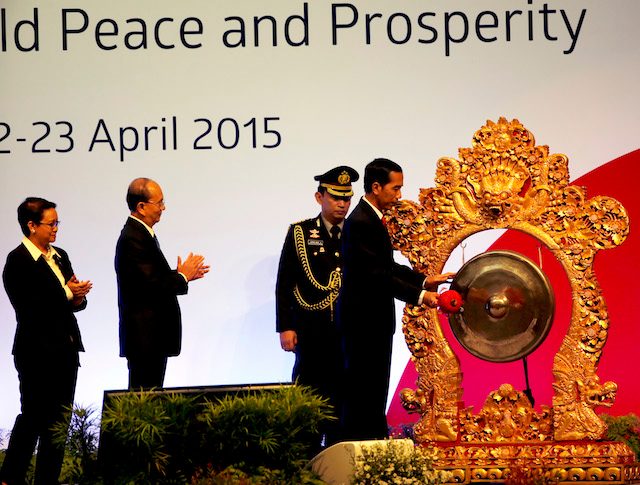SUMMARY
This is AI generated summarization, which may have errors. For context, always refer to the full article.

A series of high level summits marking the 60th anniversary of the 1955 Asian African Conference is currently underway in Indonesia. Some observers have hailed the anniversary as “a good opportunity for Indonesia to increase its global role.” At the same time, a majority of Indonesians applaud the Joko Widodo government’s tough new stance against foreigners, as it burns intruding foreign fishing boats and organizes the execution of drug smugglers, including foreigners. Indonesia’s military is currently warning its youth about the influence of “foreign proxies“, which it says may take the form of NGOs, civil society institutions, mass media and individuals. Nationalism is on the rise in Indonesia.
I will not assess here whether all sources of nationalism are positive. Nor will I predict whether Indonesia’s rising nationalism will be used for good or bad purposes in the future. I will simply reflect on positive ways that Indonesia might build nationalism.
Rising international leadership
Indonesia in the Suharto era and early 21st century was generally reluctant to play an international leadership role. This began changing under President Bambang Susilo Yudhoyono. Indonesia up-scaled its contributions in Asia and the world in such areas as peacekeeping, environmental preservation and protection, the development of multilateral organizations in the Asia-Pacific region, and the promotion of democracy and civil society. Indonesia hosted the World Economic Forum in 2011 and has now once again hosted the forum, alongside the Asian African Conference Commemoration (AACC).
The current AACC is also discussing political problems such as the oppression of the Palestinian people. More generally, Jokowi expects the summits to produce, “a strong message, especially about a new order of global balance and justice.” As a moderate Muslim nation, Indonesia is well-placed to play a moderating role to help resolve disputes in the Middle East and perhaps more widely.
Good economic prospects
Indonesia’s macroeconomic indicators are mostly positive. The Global Competitiveness Report for 2014-2015 ranks Indonesia’s competitiveness at a respectable 34 out of 144 countries, just behind Thailand at 31 and well ahead of the Philippines, at 52. The World Bank, taking into account the recent slump in oil and gas prices, still expects Indonesia’s GDP to grow by a healthy rate of 5.2 percent through 2016. The Bank further praises the Indonesian government’s initial steps to streamline procedures for business licensing. This followed praise from the International Monetary Fund for Jokowi’s fiscal and investment climate reforms.
Indonesia’s macroeconomic figures are particularly impressive when we consider the total mess that Suharto left behind, partly due to following World Bank and IMF advice in the 1990s. Following the Asian Financial Crisis of 1997-98, 50% of Indonesia’s 1999 budget and 40% of its 2000 budget was devoted just to debt servicing. Suharto’s sudden departure sparked ethnic conflicts right across the archipelago. Most of these conflicts have been successfully cooled. Indonesia has reached a remarkable level of stability compared to the problems of 1998-2001.
Future sources of national pride
Healthy macroeconomic indicators may be a source of pride for Indonesia’s middle and upper classes. The number of cars and air-conditioned shopping malls in Indonesia continues to rise. However, for the roughly 40% of all Indonesians living below $2 per day, macroeconomic indicators are pretty meaningless. In fact, one study of the period 2004-2014 found that, “The gulf between rich and poor has widened in Indonesia more than in any other developing country.” To improve government assistance to the poor, the Jokowi presidency is introducing Indonesian health cards, Indonesian smart cards, and prosperous family cards. If opportunities and services for the poor can improve, more Indonesians can take pride in Indonesia’s macroeconomic figures.
Right across the Indonesian archipelago – particularly where the palm oil industry is expanding – provincial governments are mired in conflicts over land ownership. The murder of a farmer last month by security personnel employed by an oil palm company was nothing new in Indonesia. There was a promising ruling by Indonesia’s Constitutional Court in July 2013, confirming that customary owned forests were not state-owned forests, but the ruling has not been followed up by local governments to protect traditional people’s land rights. Forests conservation is only loosely enforced. A 2014 study found Indonesia to have the highest annual deforestation rate in the world. Much work is needed before Indonesians can become proud of their rural harmony and Indonesia’s long-term biodiversity.
Finally, President Jokowi’s desire to provide leadership on issues of global justice is welcomed. The world needs leaders of Jokowi’s integrity. However, Indonesia will have a stronger voice on global justice issues if it can first repair its own justice system.
Recent surveys show Indonesians rate their police force as the most corrupt institution in the country. Earlier this year, Indonesia’s Corruption Eradication Commission (KPK) had its highly respected leaders criminalized and the man who led the criminalization drive, Badrodin Haiti, was last week appointed as Indonesia’s new national police chief. Earlier this week, he appointed Budi Gunawan, the police commissioner previously blocked from the top police job due to corruption suspicions, as the deputy National Police chief. Indonesians may soon be able to take pride in Jokowi’s promotion of justice overseas, but not in their own justice system.
Indonesia is coming into the world spotlight perhaps more than ever before. Whether it is indeed ready to be in the global spotlight will depend greatly on its government policies during the Jokowi presidency.
Warren Doull (pseudonym) worked for UNTAET in Timor Leste in 2001-2002 and has also lived and worked extensively in Indonesia.
Add a comment
How does this make you feel?
There are no comments yet. Add your comment to start the conversation.